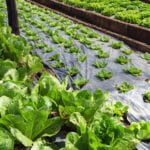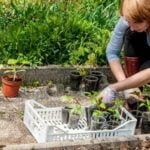Many gardeners may wonder, “Do vegetable gardens attract mice?” It is a common concern for those who cultivate their own produce, as mice can cause significant damage to plants and potentially spread diseases. This article will explore the potential relationship between vegetable gardens and mice, as well as provide insights into understanding mouse behavior and effective prevention methods.
Understanding the behavior of mice is crucial in addressing the concern of whether they are attracted to vegetable gardens. Mice are typically drawn to areas that offer both food sources and adequate shelter, making gardens a potential target for these rodents. By examining their habits and preferences, we can better understand how to deter them from our gardens.
Analyzing the connection between vegetable gardens and mice will shed light on specific elements of a garden that might attract these rodents. Whether it’s the availability of fruits, vegetables, or grains, there are various factors within a garden that may entice mice to take up residence. By identifying these factors, we can then explore effective prevention methods to keep them at bay.
It is important for gardeners to be aware of the potential risks associated with having mice in their vegetable gardens. Not only can these rodents cause damage to plants and produce, but they also present health concerns through the spread of diseases and contamination. In this article, we will delve into common signs of mice in the garden and provide practical strategies for preventing them from being attracted to and entering our precious vegetable plots.
Understanding Mice Behavior
Mice are small mammals that are known for their ability to adapt to various environments and find sources of food and shelter. Understanding their behavior is crucial in addressing the concern of whether vegetable gardens attract mice. Mice are attracted to areas with abundant food and places to hide, making vegetable gardens a potentially appealing destination for them.
One of the main factors that attract mice to certain areas is the availability of food. Vegetable gardens provide a variety of fruits, vegetables, seeds, and nuts that can serve as a food source for mice. Additionally, the presence of compost bins or piles in gardens can also be attractive to mice as they can find leftover food scraps and organic materials to feed on.
In addition to seeking out food sources, mice are also drawn to areas that provide shelter and protection from predators. This includes dense vegetation, bushes, tall grass, woodpiles, and other similar hiding spots commonly found in vegetable gardens. These elements not only offer mice a place to seek refuge but also provide nesting sites for them.
To further understand what typically attracts mice to certain areas, it is important to acknowledge their natural behaviors and habits. Mice are known for being opportunistic feeders and will consume a wide range of foods including seeds, grains, insects, fruits, vegetables, and even meat if given the opportunity. In terms of shelter preferences, mice tend to favor dark, secluded spaces such as burrows or under debris where they can build nests and raise their young.
Ultimately, while there is evidence suggesting that vegetable gardens can attract mice due to the availability of food sources and suitable hiding spots, there are numerous effective strategies that gardeners can employ to deter these rodents from infesting their garden spaces. By implementing proper prevention methods and understanding the behavior of mice, individuals can minimize the risk of attracting these animals while still enjoying the benefits of growing their own fresh produce.
Relationship Between Vegetable Gardens and Mice
Many people wonder, do vegetable gardens attract mice? While it’s a common concern, the relationship between vegetable gardens and mice is not always straightforward. To understand this better, it’s important to analyze the potential connection between vegetable gardens and mice, as well as look at the specific elements of a garden that might attract these rodents.
One major factor that may attract mice to vegetable gardens is the presence of easily accessible food sources. Mice are primarily herbivores and are attracted to the abundance of fruits, vegetables, seeds, and plants that can be found in a typical garden. Additionally, the shelter provided by dense foliage and compost piles can also make vegetable gardens an appealing habitat for mice to nest and reproduce.
The presence of moisture in gardens can also be a contributing factor. Mice are attracted to areas with available water sources, and neglected watering systems or excessive moisture from overwatering can create an environment that is attractive to these pests. Therefore, it’s important for gardeners to maintain proper irrigation practices to minimize potential attractions for mice.
To further illustrate the potential connection between vegetable gardens and mice and how certain elements of a garden can attract them, consider the following points:
- The types of plants grown in the garden
- The accessibility of potential nesting sites
- How food waste is managed within the garden
Understanding these factors can help gardeners take proactive measures to prevent attracting mice to their vegetable gardens.
Common Signs of Mice in the Garden
Vegetable gardens are a wonderful addition to any home, allowing people to grow their own fresh produce and connect with nature. However, one common concern that many gardeners have is whether vegetable gardens attract mice.
This is a valid concern, as mice are known for being attracted to areas with readily available food sources and shelter. In this section, we will explore the typical signs that indicate the presence of mice in a vegetable garden and how to identify if there is a mouse infestation in your garden.
One of the most common signs of mice in a vegetable garden is damage to plants. Mice are known for nibbling on various types of vegetables and fruits, leaving behind telltale signs of their presence. Look for small bite marks on plants and missing pieces of produce.
Additionally, check for droppings near damaged plants, as mice often leave droppings close to their feeding areas. The presence of burrows in the soil is also an indicator of mouse activity in the garden, as these small rodents create tunnels and nests under the ground for shelter.
Identifying these signs early on can help you take action to effectively address the issue before it becomes a larger problem. By recognizing the presence of mice in your vegetable garden, you can then implement preventative measures and work towards creating an environment that is less attractive to these pests.
| Common Sign | Indication |
|---|---|
| Damage to Plants | Nibbled vegetables and fruits, small bite marks on plants |
| Droppings | Small feces near feeding areas |
| Burrows | Tunnels and nests under the ground |
Prevention Methods
Natural Deterrents
One of the most effective ways to prevent mice from being attracted to vegetable gardens is by using natural deterrents. These can include planting strong-smelling herbs and flowers, such as mint, lavender, or marigolds, around the garden. Mice are often repelled by these scents and will be less likely to approach the area.
Another natural deterrent is the use of predator urine, such as that of foxes or coyotes. These can be purchased in garden centers and sprinkled around the perimeter of the garden to create a barrier that mice will avoid.
Barriers
Installing physical barriers around the vegetable garden can also help prevent mice from entering. This can include using wire mesh or hardware cloth to create fencing that extends at least a foot below ground to prevent burrowing. Additionally, covering crops with row covers or individual plant cages can protect them from being damaged by mice.
Proper Garden Maintenance
Maintaining the cleanliness and organization of the vegetable garden is essential for preventing mice from being attracted to it. Ensuring that all fruits and vegetables are harvested promptly can eliminate potential food sources for mice. Keeping the garden free of debris, such as fallen leaves or woodpiles, can also remove potential hiding spots for these rodents. Additionally, regularly inspecting and repairing any damaged structures or entry points can help keep mice out of the garden.
Natural Predators
The presence of mice in vegetable gardens can be a cause for concern due to the potential damage they can inflict on plants and the health risks they pose. However, one effective method for controlling mice populations in and around vegetable gardens is by attracting natural predators. Natural predators such as birds of prey, snakes, and certain types of insects play a crucial role in keeping mouse populations in check.
Birds of prey, particularly owls and hawks, are known for their ability to hunt and consume mice. By providing suitable nesting sites or installing owl boxes, gardeners can encourage these raptors to make a home near the garden. Similarly, snake-friendly habitats can also attract these reptiles, which are excellent at controlling rodent populations. Additionally, insects like ladybugs and praying mantises are natural predators of smaller pests that may attract mice due to their presence.
Attracting natural predators to the garden not only helps control mouse populations but also contributes to the overall ecological balance. It reduces the need for harmful chemical pesticides while promoting a more sustainable approach to pest control. By creating a favorable environment for natural predators, gardeners can effectively manage potential mouse infestations without compromising the health and safety of their produce.
| Natural Predator | Role |
|---|---|
| Owls | Hunt and consume mice; provide natural pest control |
| Snakes | Control rodent populations; contribute to ecological balance |
| Ladybugs & Praying Mantises | Natural predators of smaller pests; help reduce attraction of mice |
Health Risks and Concerns
Having mice in your garden can pose significant health risks and concerns, particularly when it comes to the potential spread of diseases and contamination of produce. It is important to be aware of these risks and take proactive measures to prevent mice from entering your vegetable garden.
Spread of Diseases
Mice are known carriers of various diseases that can be transmitted to humans, either directly through contact or indirectly through contaminated food or water. Some of the diseases associated with mice include hantavirus, leptospirosis, salmonellosis, and lymphocytic choriomeningitis. These diseases can have serious consequences for human health, ranging from flu-like symptoms to potentially life-threatening conditions. Therefore, it is crucial to minimize the presence of mice in your garden to reduce the risk of disease transmission.
Contamination of Produce
In addition to spreading diseases, mice can also contaminate produce in the garden. Their droppings, urine, and hair can all contribute to the contamination of fruits and vegetables, making them unsafe for consumption. This poses a significant risk to you and your family’s health if contaminated produce is unknowingly consumed. Furthermore, the damage caused by mice as they feed on plants can render certain crops unsuitable for consumption or sale.
Preventive Measures
To reduce the health risks associated with having mice in your garden, it is essential to implement preventive measures such as using natural deterrents like peppermint oil or garlic, installing barriers like fencing or mesh around the garden perimeter, and maintaining proper garden hygiene. Regularly inspecting the garden for signs of mice and promptly addressing any infestations is also key in minimizing health risks.
By taking these actions, you can create a safer environment for yourself and your family while enjoying the benefits of a thriving vegetable garden.
Conclusion
In conclusion, vegetable gardens can indeed attract mice, especially if certain conditions are present. Mice are attracted to vegetable gardens because they provide a consistent food source and shelter. Their presence can lead to damage to plants, the spread of diseases, and contamination of produce, posing risks to both the garden and those who consume its products.
To prevent mice from being attracted to and entering vegetable gardens, there are various effective strategies that can be implemented. These include using natural deterrents such as peppermint or garlic, creating physical barriers like fences and wire mesh, and practicing proper garden maintenance by removing excess vegetation and keeping the garden tidy.
It is important for gardeners to remain vigilant for signs of mice in their vegetable gardens and take proactive measures to mitigate the risk. By understanding mice behavior and implementing prevention methods, it is possible to maintain a thriving and pest-free garden. For further education on this topic, readers can explore additional resources including books, websites, or consulting with local gardening experts for personalized advice on managing mice in their vegetable gardens.
Frequently Asked Questions
How Do I Get Rid of Mice in My Vegetable Garden?
Getting rid of mice in your vegetable garden can be done by removing any sources of food or shelter that may be attracting them. This includes keeping the garden area clean, removing fallen fruits and vegetables, and sealing off any entry points to your garden shed or storage areas.
Are Mice Attracted to Vegetables?
Yes, mice are attracted to vegetables because they provide a source of food for them. Additionally, the shelter provided by a dense vegetable garden can make it an attractive habitat for mice seeking cover and food.
Will a Vegetable Garden Attract Rats?
A vegetable garden can potentially attract rats if there is an abundance of food and shelter available. To prevent this, it’s important to keep the garden clean, remove any debris or overgrown vegetation that could serve as hiding spots, and securely store any harvested produce to avoid attracting rats.
Regularly inspecting the garden for signs of rodent activity can also help in preventing rat infestations.

If you’re looking to get into vegetable gardening, or are just looking for some tips on how to make your current garden better, then you’ve come to the right place! My name is Ethel and I have been gardening for years. In this blog, I’m going to share with you some of my best tips on how to create a successful vegetable garden.





